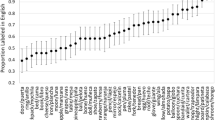Abstract
Bilingual code switching within sentences (as in “The towel roja was dirty”) is often observed in bilingual communities. The present study addressed two issues. First, what is the nature of the grammatical rules that underlie code switching? Second, how do bilingual speakers acquire such rules? We addressed the first issue by obtaining judgments of the grammaticality of four types of sentences containing code-switched words. Judgments of acceptability seemed to be based on two rules: (1) Code switching can occur only when the code-switched words are positioned in accord with the rules for which they are approriate lexical items; (2) code switching within word boundaries is considered ungrammatical. We addressed the second issue by exploring the effects of age and code switching experience on the grammatical judgments of bilingual children and adults. Extensive code-switching experience did not seem to be necessary for bilingual speakers to know the grammatical constraints of code switching. This suggests that the constraints of code switching are based on the integration of the grammars of the two code-switched languages rather than on the creation of a third grammar. There were developmental changes in the judgments made to the sentences. All aged subjects found sentences that violated the word-order rule (1 above) unacceptable. However, the youngest children (8- to 10-year-olds) found mixing within a word acceptable. This developmental change could be due to a change in the grammar of code switching, in the ability to make metalinguistic judgments, or in the child's general knowledge about the nature of languages.
Similar content being viewed by others
References
Aguirre, A. (1980). Toward an index of acceptability for code alternation: An experimental analysis.Aztlan, 11, 297–322.
Bentahila, A., & Davies, E. (1983). The syntax of Arabic-French code-switching.Lingua, 59, 301–330.
Brown, R. (1973).A first language: The early stages. Cambridge: Harvard University Press.
Cedegren, H., & Sankoff, D. (1974). Variable rules: Performance as a statistical reflection of competence.Language, 50, 333–355.
Genishi, C. (1981). Code-switching in Chicano six-year-olds. In R. Duran (Ed.),Latino language and communicative behavior, Norwood, New Jersey: Ablex.
Gingras, R. (1974). Problems in the description of Spanish-English intrasentential code-switching. In G. Bills (Ed.),Southwest areal linguistics. San Diego: Institute for Cultural Pluralism.
Gumperz, J. (1977). The sociolinguistic significance of conversational code-switching.RELC Journal, 8, 1–34.
Huerta, A. (1977). The acquisition of bilingualism: A code-switching approach.Sociolinguistic Working Paper 39. Austin, Texas: Southwest Educational Development Laboratory.
Labov, W. (1969). Contraction, deletion, and inherent variability of the English copula.Language, 45, 715–762.
Lipski, J. (1978). Code-switching and the problem of bilingual competence. In M. Paradis (Ed.),Aspects of bilingualism. Columbia, South Carolina: Hornbeam Press.
McClure, E. (1977). Aspects of code-switching in the discourse of bilingual Mexican-American children. In M. Saville-Troike (Ed.),Georgetown University Round Table on Languages and Linguistics. Washington, D.C.: Georgetown University Press.
McClure, E., & McClure, M. (1975). Code-switching among Mexican-American children. In H. Sharifi (Ed.),From Meaning to sound. Lincoln: University of Nebraska.
Pfaff, C. (1979). Constraints on language mixing: Intrasentential code-switching and borrowing in Spanish-English.Language, 55, 291–318.
Poplack, S. (1980). Sometimes I'll start a sentence in Spanish y termino en Espanol: Toward a typology of code-switching.Linguistics, 18, 581–618.
Saywitz, K., & Wilkinson, L. C. (1982). Age-related differences in metalinguistic awareness. In S. Kuczaj (Ed.),Language development (Vol. 2), Hillsdale, New Jersey: Erlbaum.
Sole, Y. (1975). Sociolinguistic perspectives on Texas Spanish and the teaching of the standard language. In G. Harvey & M. Heiser (Eds.),Southwest languages and linguistics in educational perspective, San Diego: Institute for Cultural Pluralism.
Timm, L. (1975). Spanish-English code-switching: El porque y How-not-to.Romance Philology, 28, 473–482.
Wentz, J. (1977).Some considerations in the development of a syntactic description of code-switching. Unpublished doctoral dissertation, University of Illinois.
Wentz, J., & McClure, E. (1976). Aspects of the syntax of the code-switched discourse of bilingual children. In F. J. Ingemann (Ed.),1975 Mid-America Linguistics Conference papers. Lawrence, Kansas: University of Kansas.
Author information
Authors and Affiliations
Additional information
This research was partially supported by a University of Texas at Dallas Organized Research Grant to the first author. We are grateful to the bilingual adults and children who agreed to participate in the study, to Anita Suster for her assistance in data collection, to Steve Chapin for his assistance in the data analyses, and to James Bartlett, W. Jay Dowling, and Stan A. Kuczaj II for comments on an earlier draft to this paper. Portions of this paper were presented at the Southwestern Society for Research in Human Development meeting held in Galveston, Texas, March 1982, and at the Society for Research in Child Development meeting held in Detroit, Michigan, April 1983.
Rights and permissions
About this article
Cite this article
Lederberg, A.R., Morales, C. Code switching by bilinguals: Evidence against a third grammar. J Psycholinguist Res 14, 113–136 (1985). https://doi.org/10.1007/BF01067625
Accepted:
Issue Date:
DOI: https://doi.org/10.1007/BF01067625




